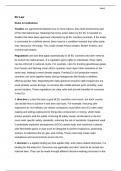P4M3
EU Law
Rules & Institutions:
Treaties are agreements between two or more nations, they bind and become part
of the international law. Meaning that every action taken by the EU is founded on
treaties that have been approved voluntarily by all EU member countries. If the treaty
is concluded for a definite period, there may be a condition inserted that either party
may ‘denounce’ the treaty. This could include Peace treaties, Border treaties, and
Commercial treaties.
Regulations are laws that apply automatically in all EU countries and don't need to
be turned into national laws. If a regulation gives rights to individuals, those rights
can be enforced in national courts. For example, rules for tracking greenhouse gases
from forests and farming mean all EU countries must report their emissions in the
same way, helping to meet climate targets. Pooling EU civil protection means
countries can work together faster during emergencies like floods or wildfires,
offering quicker help. Regulating the radio spectrum ensures radio frequencies are
used similarly across Europe, so services like mobile phones work smoothly, even
across borders. These regulations set clear rules and provide benefits for everyone
in the EU.
A directive is a law that sets a goal all EU countries must reach, but each country
can decide how to achieve it with their own laws. For example, ensuring safe
explosives for non-military use means companies must follow strict EU rules when
making and selling explosives for things like construction or mining, which helps
protect workers and the public. Ensuring lift safety means all elevators in the EU
must meet specific safety standards, reducing the risk of accidents. Equipment used
in potentially explosive atmospheres (ATEX) means tools and machines in places
with flammable gases or dust must be designed to prevent explosions, protecting
workers in industries like oil, gas, and mining. These rules help create safer
workplaces and environments across the EU.
A decision is a legally binding act that applies fully, and unless stated otherwise, it is
binding for the entire EU. Decisions are applicable and don’t need to be turned into
national laws. They can be made through different decision-making processes in the
, EU, with strict rules on what parts can be changed later. For example, common EU
rules for imports ensure that products entering EU countries meet the same safety
and quality standards, making it easier for businesses to trade and ensuring safe
products for consumers. The European Insurance and Occupational Pensions
Authority (EIOPA) helps regulate insurance companies and pension funds across the
EU, protecting consumers and keeping the financial system stable. National
technical regulations and free movement of goods mean that products approved in
one EU country can be sold in others without extra checks, making trade easier for
businesses. These rules help create a safer and more connected market for
everyone in the EU.
Intuitions of the EU
The European Commission suggests new EU laws and policies, makes sure they
are properly applied in all Member States, negotiates international agreements for
the EU, and manages funding. It also represents the EU's interests globally, making
sure EU countries work together. Each commissioner is given a specific area to
1
focus on, like energy, the economy, or the environment, by the president.
The Council of Ministers is made up of government ministers from each EU
member state. It meets in different groups depending on the policy being discussed,
with each country sending the minister responsible for that area. Its main role is to
discuss, amend, and approve EU laws along with the European Parliament.
The EU Parliament is a key place for political debate and decision-making at the EU
level. Members of the European Parliament (MEPs) are directly elected by voters in
all member states to represent people's interests in making EU laws and ensuring
other EU institutions work democratically. The Parliament works with the Council to
pass and change laws and decide on the EU budget. It also oversees the work of the
Commission and other EU bodies and works with national parliaments of EU
countries to get their input.
The European Court of Justice (ECJ) is based in Luxembourg and has 27 judges,
one from each EU country. It hears cases from national courts through the
"preliminary" system, where a national court asks the ECJ to clarify how EU law
should be interpreted. While national courts must apply EU law, different countries
1
https://op.europa.eu/webpub/com/eu-and-me/en/HOW_DOES_THE_EU_WORK.html




